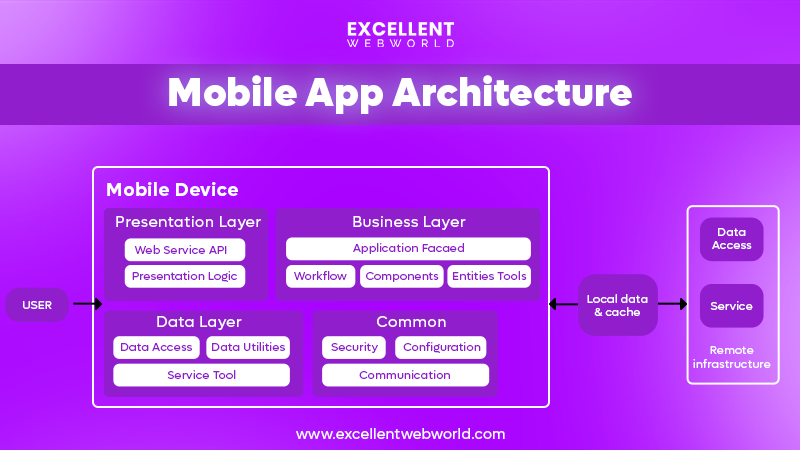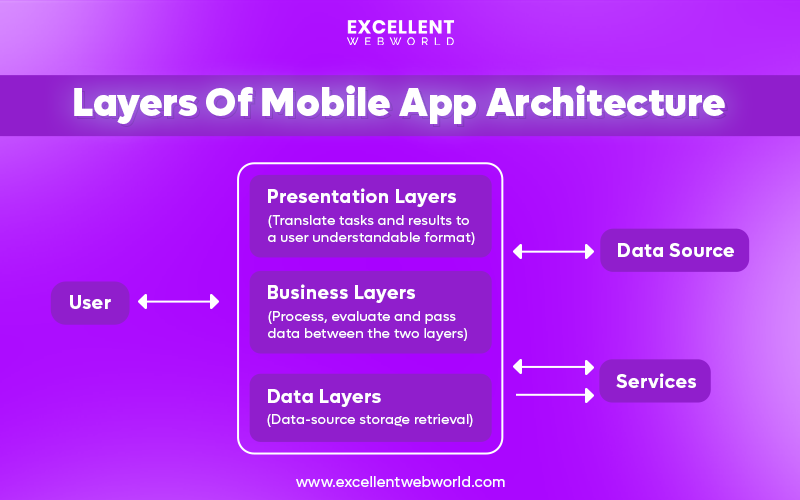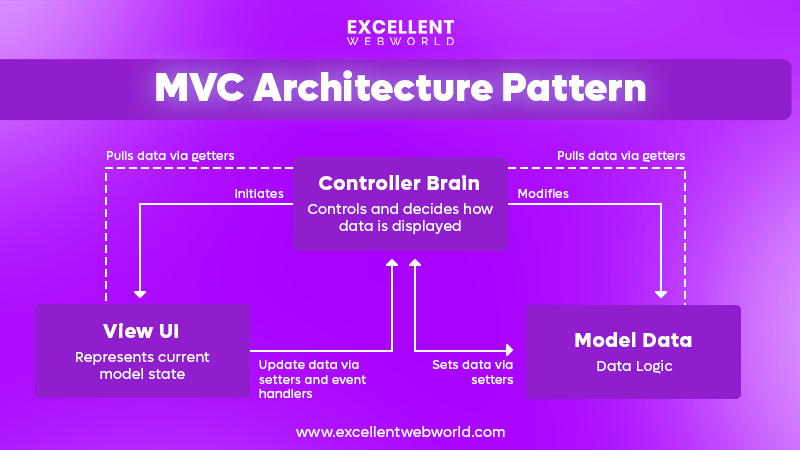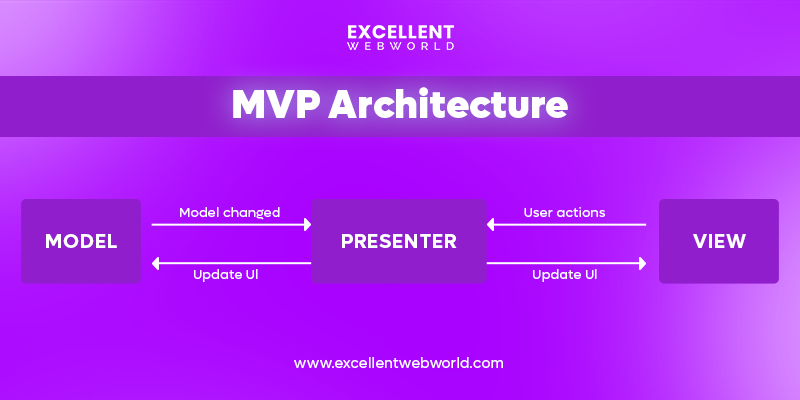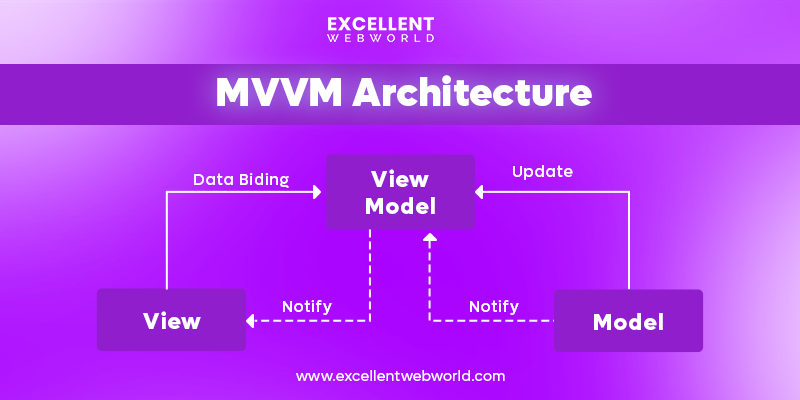Mobile is the primary source of online traffic today. With 53.42% of traffic coming from mobile and smartphones in the last quarter of 2023, you can expect most businesses to try to leverage it for success. This is where the debate of web apps vs mobile apps begins.
Web apps are attractive because they require minimal development effort compared to mobile applications. However, developing mobile apps makes more sense if you have a specific target audience.
So, which one to choose?
This article will help you decide between a web app and a mobile app development approach. It includes an overview of both methods, differences, examples, use cases, and pros and cons. Let’s begin with an overview of web apps and mobile apps.
What is a Web App?
A web application is the app version of a website that can be accessed through a browser. When accessed on a smartphone, it behaves like a mobile app. So, if you want to build a web app, the first step will be to ace your website development. Further, a web app allows users to interact with the business to exchange information or get services remotely.
For example, if you have an eCommerce web app, the shopping cart, product search feature, filtering products, instant messaging, and social media news feeds are all web apps. Similarly, an online retail fashion company using pre-loaded HTML, JavaScript, or CSS code in the browser are also web apps often known as the Single Page Applications (SPA).
How Does a Web App Work?
A website is a group of web pages, mainly static ones. However, if your website has static and dynamic web pages, it becomes a web application. This is an approach where you turn your website into a mobile app.
So, what’s the differentiation?
An analysis of web application architecture can help you understand how it differs from your website. Plus, it also enables you to know how the web will work.
When a user makes a data request to a web or mobile app, different components, such as the UI, middleware systems, databases, servers, and browsing, interact with each other. The web app architecture is the standard framework that ties everything together.
This framework defines the relation between different web app components. To ensure security across these interactions, developers often work with experts for web application penetration testing. Web applications run on the client side and server side. So when a user makes a request, two programs run on both the client and server sides,
Defining the client and server functions is essential when you develop a web application. It allows you to establish a correlation between the client-side and server-side functions.
The server-side function creates the page on which the user requests data storage types. Most server-side code remains hidden from a user. Client-side code, on the other hand, is parsed by the browser and is easily editable by the users.
Now that you know how it works, here are some pros and cons.
Pros And Cons of Web Applications
Knowing the pros and cons of web vs mobile apps for your project is essential.
Pros of Web Apps
Cons of Web Apps
The pros and cons will help you decide whether developing a web mobile app makes sense. However, many web apps are already in the market, which will help you understand how the successful development of web apps makes a difference.
Examples of Web Applications
Web apps have specific limitations but offer several benefits for startups and enterprises.
Here are some examples of web apps built by giants like Google.
| Web App Name | Features |
|---|---|
| Netflix | Streaming services across web and mobile devices |
| Auto-complete tweets and the capability for users to create groups for tweet feeds. | |
| Google Doc | Real-time collaboration on text-based tasks with commenting and note-taking |
| A visual search engine where users can share their favorite photos with others. | |
| Medium | Users can add tweets, YouTube videos, and Vines to the content. |
You now know what a web application is and its pros and cons. Plus, you also know how it works and what famous examples are. These data will help you decide whether to build a mobile web app. However, there is one more aspect to consider- “Use Cases!”
When to Build a Web App?
You must choose web apps over mobile apps if,
The first contender in your web app vs mobile app battle is set, and now it’s your turn to examine the challenger (mobile apps).
What is a Mobile App?
Mobile applications are specific software developed for smartphones and tablets. One significant difference between mobile and web apps is native compatibility. Mobile apps have more native capabilities based on the platform, ensuring a better user experience.
Different categories of mobile apps exist that you can develop based on business requirements. For example, native apps are built based on the requirements of specific platforms. Android and iOS applications are native applications.
Other types of mobile apps are,
It is important to note that despite several differences between web and mobile applications, web apps are also considered one type of mobile app. Knowing the types of mobile apps without understanding how they work can be detrimental.
How Do Mobile Apps Work?
Mobile applications have different layers that work cohesively to offer a unique user experience. A mobile app is like a well-oiled machine. The functionality will suffer if you shuffle anything in its structure!
What users interact with is the presentation layer. It has a user interface and a presentation logic that ensures that data sent from the “Data Layer” is presented optimally. However, you can directly provide live data to the presentation layer for real-time access. For example, live scores in matches or stock updates on your mobile app often fetch real-time data to present in UI.
The business layer determines how any function will be executed within the app. It executes the business logic and determines how a mobile application must behave in specific scenarios. So, the business layer decides what to do if a user asks the app to perform a particular function or provide data.
Lastly, the data layer is where your app server will be. This layer is also a key access point for your business layer to fetch data from external resources. The primary purpose of a data layer is to gather data from different sources and provide it to the business layer.
The business layer received raw data from the data layer that needed processing. Only after processing will the required data be sent to the user.
How mobile apps work differs from how web applications work. However, if you are looking for the difference between mobile and web apps in terms of architecture, both differ in many ways. Especially mobile app architecture patterns offer much more efficient performance.
Some of the mobile app architecture patterns that you can use are,
1. Model-View-Controller (MVC)
In MVC architecture, the model part handles data, the controller part processes data, and the view components represent it. This architecture is one of the most used in iOS apps.
2. Model-View-Presenter (MVP)
MVP architecture pattern used for app development is similar to MVC. However, a significant difference is the “Presenter,” which is analogous to the controller component in MVC.
So, the view part takes the charge rather than the controller component. Plus, you have a reusable view part, which makes the entire architecture modular.
3. Model-View-ViewModel (MVVM)
MVVM architecture separates the code logic by minimizing UI element manipulation. This architecture employs data binding to bridge the View and ViewModel parts.
ViewModel has the application logic, which allows it to work without the View part.
You can use these architectures to make your mobile app modular and efficient. But before you decide whether to build a web or mobile app based on architectural advantages, here are some pros and cons.
Pros and Cons of Mobile Apps
Pros of Mobile Apps
Cons of Mobile Apps
Knowing the pros and cons of mobile applications provides insight into key drivers that will impact your decision. Understanding the benefits becomes crucial, especially when comparing the differences between mobile and web apps.
However, nothing beats the good old relativity factor—yes, analyzing real-life examples helps you better understand mobile apps’ approach.
Examples of Mobile Applications
The mobile app market has increased, with more daily applications published. Mobile app usage is also rising, with over 257 billion downloads in 2023. Giants like Microsoft, new startups, and small businesses are tapping into a massive market. Some of the famous mobile app examples are,
| Mobile App Name | Features |
|---|---|
| Microsoft Word | Mobile app which can be downloaded across iOS and Android, offering offline editing capabilities |
| Adobe Photoshop | Adobe’s mobile app can be installed on mobile devices and offers editing capabilities for the users. |
| Duolingo | A mobile app to learn languages, Duolingo can be natively downloaded on iOS and Android. |
| One of the most popular messaging apps, WhatsApp, can be natively installed on mobile devices. | |
| CapCut | The video editing app CapCut is available across platforms for users. |
Knowing these examples must have been inspirational for you, and deciding whether to develop an app must have become a tad easier. But should you create a mobile app for all your projects or go for web apps? Here is the answer to whether to build a web or mobile app.
When to Build a Mobile App?
You must choose a mobile app over web apps if,
Knowing the use cases is crucial when developing a web or mobile app. This overview covered everything for both contenders, so choosing either can be challenging. Here are seven key differentiators to clarify the differences between web and mobile apps.
7 Key Differences To Compare Web App vs Mobile App
| Differentiators | Web Apps | Mobile Apps |
|---|---|---|
| User Experience | UX is complex and depends on how responsive is the website | Mobile Apps are more user-friendly, improving UX. |
| Development Costs | Web app development cost is lower than mobile apps | Due to native app requirements and platform-specific restrictions, the cost of development increases. |
| Performance and Speed | Web apps don’t load faster and perform as well as mobile apps | Mobile applications perform better and load faster due to natively designed apps that work well across devices. |
| Accessibility and Reach | Accessibility is better in web apps as it does not require users to download anything on their device | To access mobile applications, you have to download them and install them on your device |
| Maintenance and Updates | Web apps do not require regular updates. However, you must update the website and API security updates. | Mobile applications need regular updates in terms of security requirements, features, and functionalities. |
| Development Environment and Tools | Needs text editors and cross-platform IDEs for development | Need platform-specific IDEs for development. |
| Programming Languages and Frameworks | HTML, CSS, and JavaScript | Kotlin, Swift, Flutter, React Native |
1. User Experience
Maintaining user experience uniformity is a challenge in web applications. When you design the web app, even if you use a responsive approach, it does not always work on all platforms. For example, allowing users to add comments on images shared on your web application should be visible across all platforms, such as laptops, desktops, and others.
At the same time, if you compare mobile apps vs web apps solely based on the user experience, mobile applications have the upper hand. Mobile apps have a consistent UI across Android and iOS. Maintaining a uniform experience is also a challenge in mobile apps. Leveraging an expert mobile app development company can ensure consistency in UX across iOS and Android.
2. Development Costs
Developing web mobile apps can take 3-7 months, depending on complexity and other factors. Considering the 3-7 months, the average web app development cost is between $20,000 and $75,000. However, this cost can go beyond $75,000 if you are developing a fairly complex web application.
At the same time, mobile app development costs can range from $25,000 to $150,000 and even exceed $300,000. Such variations are due to the complexity of app features, the need for separate native applications for each platform, and other factors. So, there is no denying that converting your web app ideas into reality costs less than developing mobile apps.
3. Performance and Speed
Web applications, especially progressive web apps (PWAs), can offer performance comparable to mobile apps. However, web apps don’t match up with mobile applications because of their native-like capabilities. A test conducted at the University of Seattle showed that PWAs had better rendering speeds than mobile apps.
PWAs have a 10ms loading speed and 31ms rendering performance compared to mobile apps. While mobile apps have 9ms of loading speed, which is lower than web apps, a rendering speed of 44ms is higher.
The above test results indicate that web apps have the upper hand, especially in rendering content for users, compared to mobile apps. However, what makes mobile apps effective is the native-like look and feel, which is difficult for web apps to achieve.
4. Accessibility and Reach
Accessing a web app is far easier than accessing a mobile app due to compatibility across different platforms through browsers. Mobile devices, on the other hand, have accessibility restrictions.
Users can access mobile apps by installing them from app stores. For example, Android has the Google Play Store, and Apple has the App Store, from which users can download and access applications. In terms of reach, mobile applications do have an edge over web apps. However, this is debatable because web and mobile apps are accessible on mobile devices.
However, web apps still have the upper hand due to cross-platform compatibility and quicker access. Because users don’t need to download a web app, it becomes more convenient for them to access.
5. Maintenance and Updates
Web application maintenance is easier because you have a centralized repository to make changes and maintain the code. However, with native mobile apps, there will be separate codebases, making the maintenance much more tedious.
If you compare the web vs mobile app development process for ease of updates, web applications win. With reusable code and a centralized approach to web apps, introducing new updates becomes easy. On the contrary, you have to update two apps separately when introducing updates to a mobile application.
6. Development Environment and Tools
Web applications use text editors, integrated development environments (IDEs), and web development tools. At the same time, mobile applications are built using platform-specific IDEs like Xcode for iOS and Android Studio for Android.
If you consider the deployment of mobile apps vs. web apps, the latter has the upper hand. Web apps can be deployed on web servers that are accessible to users through a URL, while mobile apps are deployed on app stores from where users can download them. The technology stack for web app development is linear compared to mobile apps, making it more attractive to businesses.
7. Programming Languages and Frameworks
Web application development requires standards and frameworks based on website technologies. For example, HTML, CSS, and JavaScript can be used for web app development. There is no need for a specific framework or technology to build web apps.
Mobile application development requires specific technologies and frameworks. For example, if you want to develop an iOS app, you need Swift. Similarly, you need Kotlin for Android app development. A cross-platform app development project can leverage React Native or Flutter.
After seven rounds of fierce battle, the winner is web mobile apps! Is that it?
You can now decide between a mobile app vs web app.
Before you choose either, here are some factors to consider to end the web vs mobile debate.
4 Key Factors to Consider When Choosing Between Mobile App vs Web App
Apart from the difference between mobile and web apps, you must consider the following factors before deciding.
1. Target Audience and User Behavior
Before you select the best approach to web or mobile development, it is crucial to assess the target audience. First, evaluate your solutions and how they solve the problem for the target audience. Then, analyze which platform users are present on.
For example, if you target the US audience, iOS is a significant platform. So, it makes more sense to develop native mobile applications. Similarly, creating a web application makes more sense if your audience uses multiple platforms.
2. Budget and Resources
Considering the budget constraint, developing a web application is the right decision. However, if your budget permits, you can create native mobile apps. Cross-platform mobile apps do provide some reduction in development budget, but web apps are still economical in comparison.
In terms of resources, web apps have the upper hand because you will need a web server most of the time. Mobile app development needs dedicated resources for each platform. So, web app development offers a more practical option.
3. Timeline and Urgency
Time to market is an essential factor for every startup and enterprise. Introducing the product at the right time can make all the difference. So, if your project timeline is short, web apps are the best choice.
4. Long-Term Business Goals
Keeping a future-proof solution in mind, app development makes more sense. Evolving technologies like artificial intelligence need specific resources for a better user experience. This is why developing a mobile app with local computing capabilities can be fruitful for such innovative features.
These factors help you determine which one to choose between mobile app vs web app but if you when is the right time to switch?
When Should You Switch From a Web App to a Mobile App?
For any startup the ideal scenario is to begin with a web application. Especially if entrepreneur already has a website creating web app becomes easier. However as the business scale you reach a point where app development become inevitable.
But, what is this inflection point?
Short answer- the point where current web app can no longer accommodate new users!
But is that all?
Nope there are other aspects to consider,
Need For Native!
Each platform has specific capabilities which can be extended for your apps with native integration. What stops you is a web app! On the contrary, developing a mobile app in the native environment allows businesses to integrate unique functionality.
Take Apple for example. Apple is set to introduce AI capabilities to the iOS. If you are looking to integrate the popular Apple Intelligence features, native mobile app development makes more sense.
Growth Probability
Estimating the growth probability is not easy! However if your web app is limiting the growth of business, it’s time to rethink. Web apps can have scaling issues especially with infrastructure costs. For example if you are handling more than 500 requests parallely on the web application.
If you scale to say 5000 requests, the overhead can make site crumble leading to disruptions in user experience. Native apps with cloud-based infrastructure can help you process requests in millions.
Take instagram for example, a social media native app which began as Burbn(web app). On October 16th 2010, Instagram was officially launched as a native iOS app. On the launch day itself app registered 25,000 new users and by the end of first week it was 100,000x. So, if you are looking for an option that suits your scaling needs you can switch from a web app to mobile app. Further, you can consider leveraging SaaS app development to scale even higher than mobile apps by using cloud-based services to your advantage.
Security & User Trust
Web apps are safe to use but if a single plugin or theme element gets corrupted in your website, it can have cascading effect. So if you are looking to improve security of your app and ensure smoother business operations, switching from web apps to mobile app makes more sense.
But, do mobile app have no security issues?
Nope, mobile apps can have issues of security but what makes native apps more secure is the operating system requirements. Each OS platform, Android and iOS has specific set of security requirements that developers need to fulfill and then only they can publish apps on the app store. So, in inherently the apps are secure.
Plus, native apps need regular security patches that make them more secure. On the contrary, web apps can face security risks due to outdated plugins that lack updates or security patches over time. This is where cloud app comes into play and offers an advantage. So, when comparing web apps vs cloud apps, cloud-based applications often provide better security measures, auto-updates, and data protection. If security is your priority, transitioning from a web app to a native or cloud-based application can be brilliant.
Time To Decide Then!
Deciding between a web app and a mobile app is a layered decision. To make a comprehensive comparison, you must analyze differences, pros, cons, key examples, and architecture. You must also consider the development cost, timelines, and target audience. Considering everything, the decision to choose either a web app or a mobile app has its challenges.
Fortunately, Excellent Webworld can help you overcome these challenges through tailored solutions and a team of web and app development experts. Contact our experts to determine whether a web or mobile app suits your project requirements.
Frequently Asked Questions
Target demographic, user experience, functionality, and intended use cases help determine whether a mobile or web app is superior. Mobile apps are usually best if you need offline access. They are also the best option to offer improved performance, increased engagement through push notifications, and access to device-specific capabilities.
Web apps are affordable and straightforward to create and implement since they can be accessed through any web browser without installation, offering more accessibility. The particular needs of the project and the intended audience will determine the option.
Creating a web app from scratch can vary significantly in time and complexity. It is generally quicker and easier than developing a mobile app. The time required can range from a few weeks to several months, depending on the app’s complexity, the technologies used, and the development team’s expertise.
Web apps are not available in the Google Play Store. They are accessed directly through web browsers rather than installed on users’ devices. On the other hand, mobile apps are specifically designed for Android and iOS platforms and are distributed through their respective app stores.
Yes, a web application can be converted into a mobile app. This can be achieved through approaches like hybrid app development or frameworks that support multi-platform deployment, such as Flutter. This process allows leveraging existing web app functionality while providing a native app experience on mobile devices.

Article By
Mayur Panchal is the CTO of Excellent Webworld. With his skills and expertise, He stays updated with industry trends and utilizes his technical expertise to address problems faced by entrepreneurs and startup owners.


